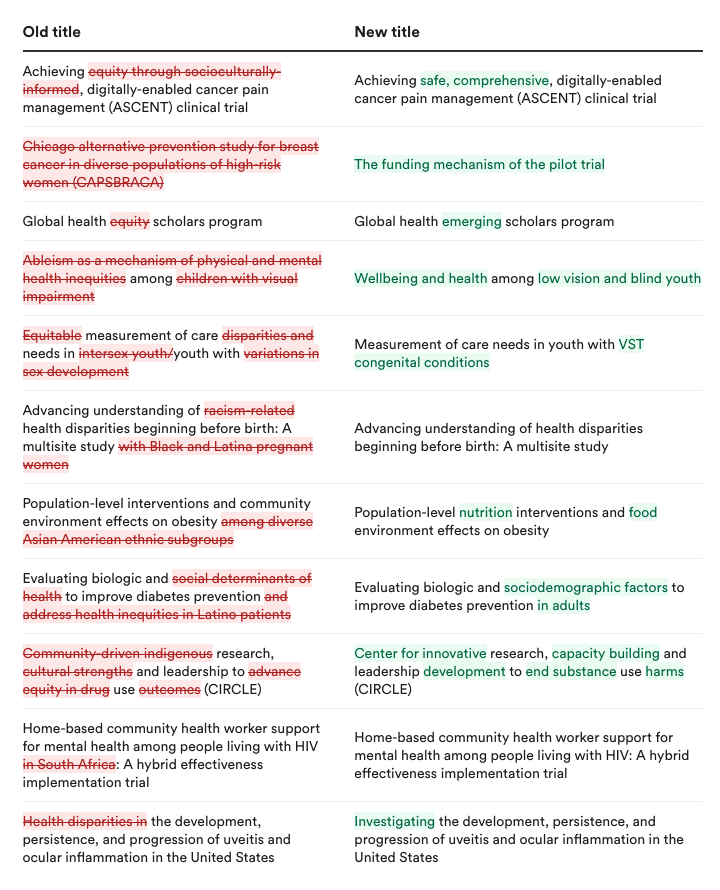Weekly Recap (Oct 31, 2025)
AI in science, Quarto, biodiversity, changed grant titles, new papers & preprints, Nextflow plugin registry, Via Scientific, R updates from R Data Scientist, rOpenSci, Posit, R Weekly, and R Works 🎃
MIT Technology Review: Biodiversity: A missing link in combating climate change
Science: At futuristic meeting, AIs took the lead in producing and reviewing all the studies.
Nextflow plugin registry: registry.nextflow.io.
posit::conf(2025) Quarto workshop materials. At posit::conf(2025), Posit hosted two Quarto workshops: Branded Websites, Presentations, Dashboards, and PDFs with Quarto; and Extending Quarto. The materials from both workshops are freely available for anyone to learn from or use in their own teaching.
rOpenSci news digest, October 2025.
The R Data Scientist newsletter (2025-10-28): Community news & roundups, Quarto & publishing, art development, mapping & visualization, economics & policy, statistical methods, academic research.
Science: AI hallucinates because it’s trained to fake answers it doesn’t know.
Nature: 7 basic science discoveries that changed the world.
Via Scientific is building a slick platform for ‘omics analysis, and I’ve joined their scientific advisory board.
WIRED story on Manhattan Genomics: A New Startup Wants to Edit Human Embryos. Seven years after the first gene-edited babies were revealed, biotech startup Manhattan Genomics is reviving the idea of editing human embryos to make disease-free children.
Chinese biotech industry shows no signs of slowing as threat of U.S. restrictions loom. Deal-making between drugmakers in the two countries remains robust.
Posit AI Newsletter (2025-10-24): Claude Haiku 4.5, Claude Skills, AI water and energy use.
(From that newsletter): The AI water issue is fake.
Have you ever worried about how much water things you did online used before AI? Probably not, because data centers use barely any water compared to most other things we do. Even manufacturing most regular objects requires lots of water. Here’s a list of common objects you might own, and how many chatbot prompt’s worth of water they used to make (all from this list, and using the onsite + offsite water value):
Leather Shoes - 4,000,000 prompts’ worth of water
Smartphone - 6,400,000 prompts
Jeans - 5,400,000 prompts
T-shirt - 1,300,000 prompts
A single piece of paper - 2550 prompts
A 400 page book - 1,000,000 prompts
Google’s Quantum Echoes algorithm breakthrough.
R Weekly 2025-W44: Mapping Antarctica; predicting when Lou Bega’s Mambo No. 5 was released based on the names of all the women mentioned in the song; Compositional modeling of plant communities with Dirichlet regression.
Scientists had to change more than 700 grant titles to receive NIH funding. Health disparities researchers fear what’s next.
Joe Rickert at R Works: September 2025 Top 40 New CRAN Packages. Computational Methods, Data, Decision Analysis, Ecology, Epidemiology, Finance, Machine Learning, Mathematics, Medical Applications, Programming, Statistics, Utilities, and Visualization.
Julia Silge on The Test Set podcast by Posit: part 1 and part 2.
Bill Gates: Three tough truths about climate. “…it will not lead to humanity’s demise.”
Adam Kucharski: Why do people assume all models are forecasts? Analysis informing a decision shouldn’t try and predict the decision it’s informing.
AI-Powered Data Science in Positron.
Finally, a few other papers and preprints that caught my attention this week:
The Risks of Industry Influence in Tech Research. See Carl’s Bluesky thread.
fastp 1.0: An ultra‐fast all‐round tool for FASTQ data quality control and preprocessing
Pre-phasing long reads improves structural variant genotyping
Lightweight multiscale early warning system for influenza A spillovers
AI-powered programmable virtual humans toward human physiologically-based drug discovery
Insights, opportunities, and challenges provided by large cell atlases
CarpeDeam: a de novo metagenome assembler for heavily damaged ancient datasets
Overcoming barriers to the wide adoption of single-cell large language models in biomedical research
Who Let the Frogs out? Illicit and Unregulated Species Translocations

